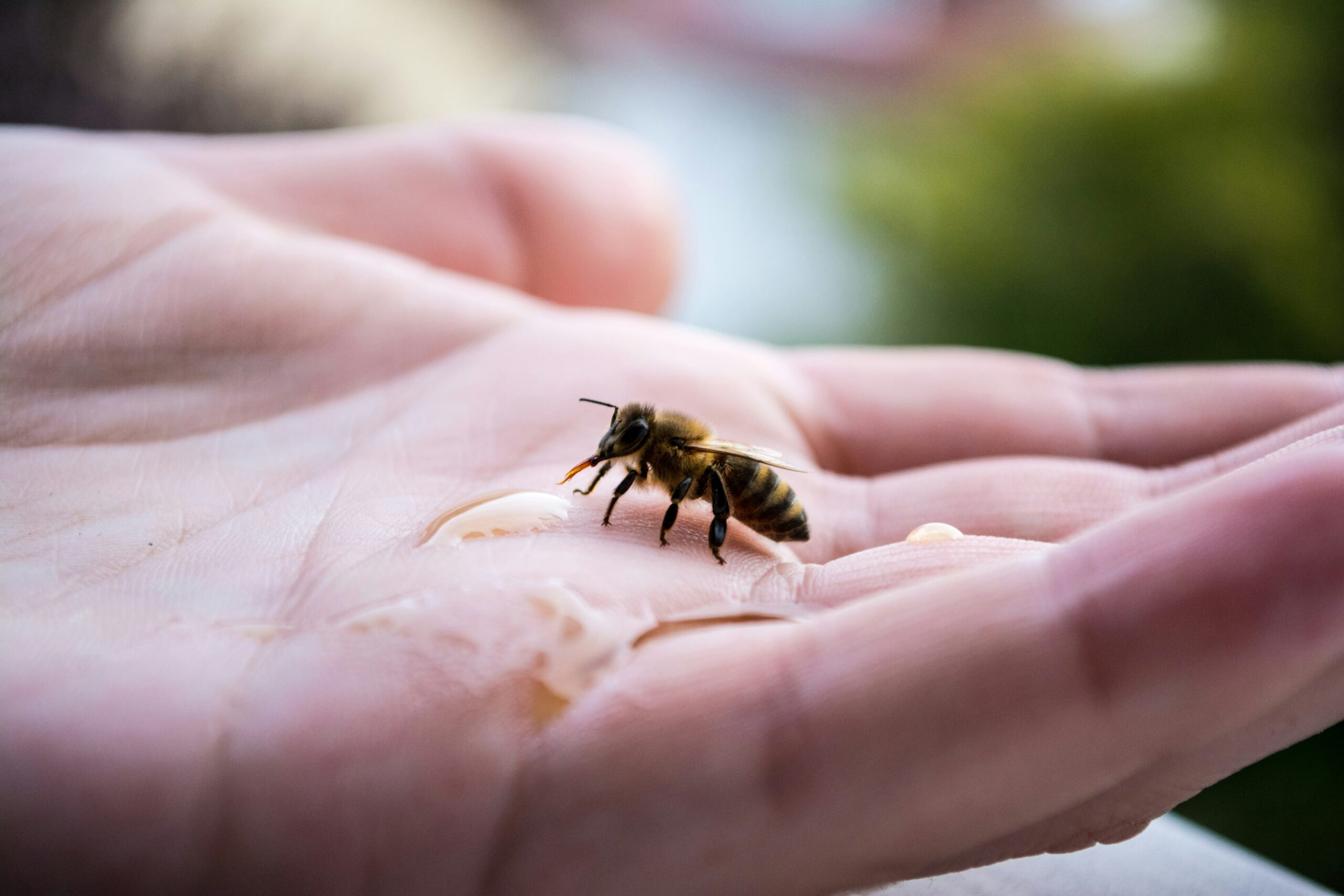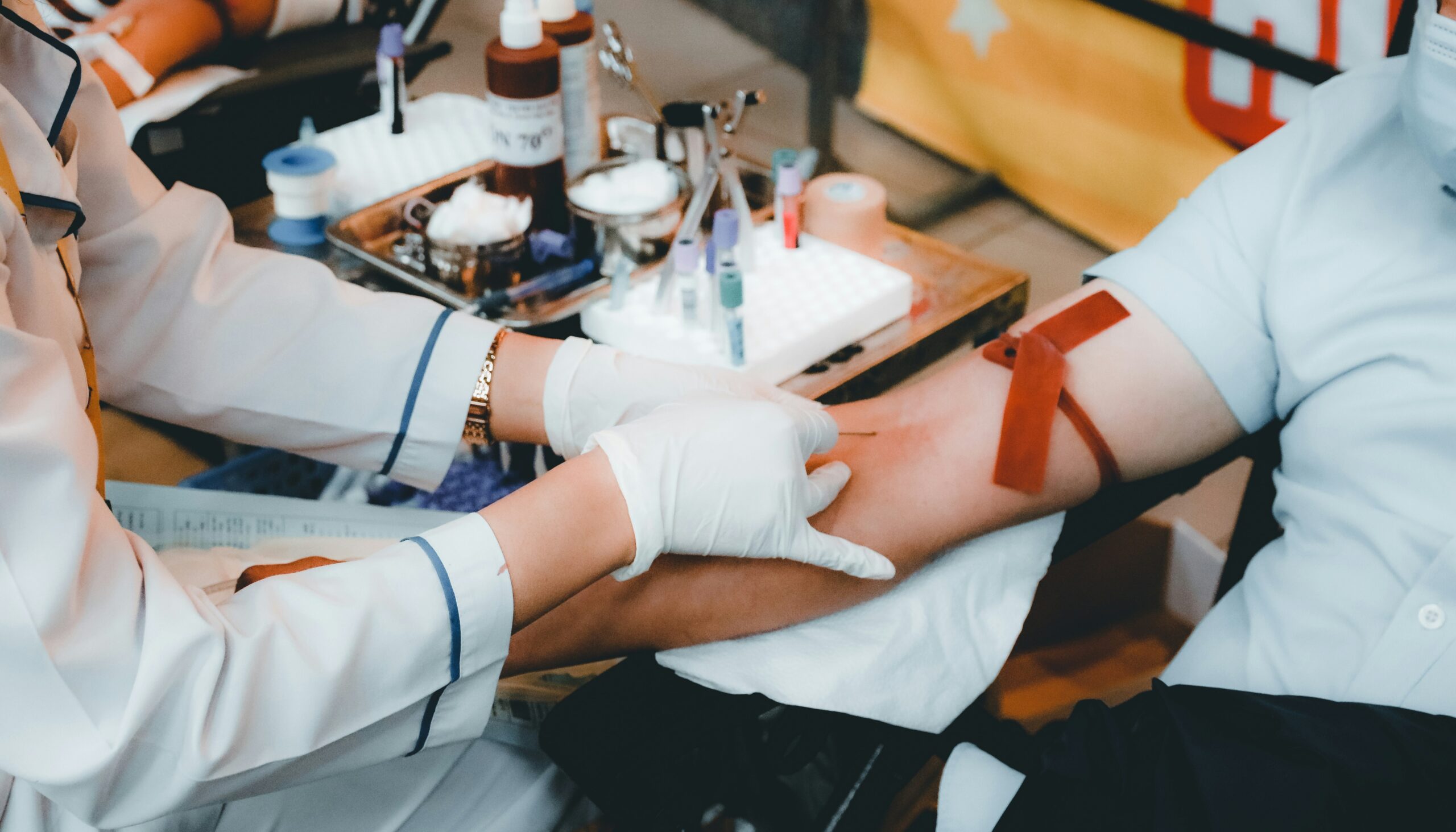When a bee sting happens, it implies the bee is working hard to push the stinger into someone's skin and put poison inside. Bees do this generally because they feel threatened or become frightened. Bees, particularly honeybees, are critical since they offer assistance in fertilizing characteristic plants. But people and other creatures might not like it when a bee stings them. Bee stings can cause diverse responses, from light torment to solid hypersensitivities. What happens depends on numerous things, like how sensitive an individual is to bee poison.
Bee stings frequently happen when the climate is warm and individuals are outside more. Cultivators, climbers, and those playing open-air sports can effortlessly get bee stings. It is being said that millions of individuals worldwide get stung by bees each year. Indeed, even though most of these cases cause, as it were, gentle responses, a few can lead to genuine hypersensitivities requiring therapeutic offer assistance. The number of bee stings is distinctive all over. A few places have more since numerous bees are living in those zones, and the environment is distinctive, as well.

The first reason a bee stings is that it has an intuitive way of ensuring itself. Bees sting if they feel a threat or disturbance near their home, the hive. Straightforward everyday occasions might cause a bee to sting, like attempting to hit a bee together with your hand, bothering its settle by mischance, or venturing on one without seeing it. Bees can be more or less forceful and may sting depending on the circumstance. Africanized honeybees![]() , which numerous individuals call “killer bees,” have a notoriety for being more defensive than European ones.
, which numerous individuals call “killer bees,” have a notoriety for being more defensive than European ones.
The parts of bee poison, made up of proteins and peptides, are complex. They make torment but also affect distinctive forms within the body. Melittin is a critical portion of nectar bee venom, causing hurt to cell membranes. That leads to torment and swelling responses. Other things like phospholipase A2 or h***********e offer assistance in spreading its effect through your body, making your safe reaction more grounded at the same time.
The signs and impacts of a bee sting can change for each individual, depending on their sensitivity to the bee's harm. For the most part, when somebody gets stung by a bee, there's instant torment along with redness and swelling where the sting happened. The discomfort is ordinarily exceptionally sharp or solid but often goes absent within a number of hours. The swelling and redness might remain for one or two days.
In some cases, somebody has a solid local reaction. This implies that their swelling gets greater and can remain for one week. As a rule, these reactions are not perilous, indeed, on the off chance that they cause inconvenience.
Now and then, many individuals have exceptionally solid, unfavorably susceptible responses called anaphylaxis. Signs of this genuine condition include having trouble breathing, swelling within the face and throat region, quick pulse, and low blood pressure that can cause dizziness or blacking out. Anaphylaxis is seen as a genuine well-being issue that needs speedy restorative care. Epinephrine ought to be given immediately; after that, more restorative offer assistance must proceed.
Issues after a bee sting can be from minor to exceptionally serious. The foremost perilous issue is anaphylaxis, which happens in individuals who have strong sensitivities to bee poison. It needs quick therapeutic assistance to prevent it from becoming deadly.
If the sting spot isn't kept clean and treated legitimately, auxiliary contaminations may be created there as well. These sorts of contaminations might result in cellulitis – a condition that causes swelling in your skin and more profound tissues requiring anti-microbials.
Numerous stings, particularly when bees attack together in enormous bunches called swarms, can cause the body to respond to harm. That happens because poison from each sting collects and might cause feelings of being wiped out, like throwing up (vomiting), having a tummy disturbed with loose bowel developments (diarrhea), cerebral pain, or indeed shaking fits called seizures. In unprecedented cases, expansive sums of poison (major envenomation![]() ) might cause kidney failure or other genuine issues for the complete body.
) might cause kidney failure or other genuine issues for the complete body.
Specialists ordinarily examine a person's body and ask about their going-ahead circumstances to recognize if they have a bee sting.
They explore for commonplace markers such as observing the stinger inside the skin, irritation around that place, and encountering torment. The regular things are, for the most part, adequate to affirm it may be a bee sting. However, if the responses are exceptionally serious or persistent and cannot comprehend why they have side effects, more methods to uncover the issue could be required.
Skin testing may be a strategy specialists utilize to decide if somebody has hypersensitivity to bee poison. In this test, they put a minor amount of the poison beneath their skin and watch for any signs of an unfavorably susceptible response. This test can offer assistance in discovering the off chance that an individual is delicate enough to be poisoned or not. It makes a difference in choosing around treatment and ways to dodge issues from bee stings.
Another way of diagnosing is the serum-specific IgE test![]() . This degree decides how many particular IgE antibodies are in a person's blood against bee poison. Suppose these antibodies appear in huge sums. In that case, it means an unfavorably susceptible reaction. It helps in anticipating whether they have a high chance of encountering serious responses such as anaphylaxis when stung by bees once more afterward.
. This degree decides how many particular IgE antibodies are in a person's blood against bee poison. Suppose these antibodies appear in huge sums. In that case, it means an unfavorably susceptible reaction. It helps in anticipating whether they have a high chance of encountering serious responses such as anaphylaxis when stung by bees once more afterward.
If someone has extreme responses, an allergist may propose a comprehensive examination involving skin and blood tests to pinpoint specific IgE antibodies. This closer examination helps develop an interesting methodology for managing and decreasing the probability of future stings.

When an individual has been stung by a bee, the best course of action is to form fewer signs and maintain a strategic distance from any issues.
For many individuals, if it's just one sting, then taking care of it at home will be okay. The primary thing you wish to do is get rid of the stinger quickly so less poison gets into your skin. Rub out the stinger with your fingernail or the edge of a credit card. Don't use tweezers since squeezing on the stinger may cause more poison.
Cleaning the sting region with cleanser and water reduces the chances of getting contamination. Applying a cold pack may help diminish torment and swelling. You'll utilize torment relievers that are promptly accessible in shops, like ibuprofen or acetaminophen, to ease your distress. Antihistamines such as diphenhydramine, likewise, make tingling and swelling less extreme.
In circumstances where nearby responses are strong, oral corticosteroids can help diminish swelling. If torment or swelling becomes amazingly extreme, more grounded torment solutions may be required, along with more therapeutic medications.
In case somebody has had awful, unfavorably susceptible reactions to bee stings in the past, they must have an epinephrine auto-injector![]() (such as an E****n) with them all the time. This gadget can give a shot of epinephrine that helps combat the side effects of serious hypersensitivity, known as anaphylaxis. This infusion offers pivotal minutes for the person to find immediate medical assistance. Patients must be instructed on the rectification strategy for utilizing an auto-injector, and they must go and get restorative offer assistance after applying it.
(such as an E****n) with them all the time. This gadget can give a shot of epinephrine that helps combat the side effects of serious hypersensitivity, known as anaphylaxis. This infusion offers pivotal minutes for the person to find immediate medical assistance. Patients must be instructed on the rectification strategy for utilizing an auto-injector, and they must go and get restorative offer assistance after applying it.
Immunotherapy, another term for allergy shots, is an amplified treatment choice for people with strong bee venom sensitivities. The treatment requires steady infusions with lifted levels of poison extricate that rise gradually. Such infusions help the body in getting to be more usual to poison step by step with time. The study shows that poison immunotherapy is exceedingly successful, diminishing the chances of serious responses.
Regularly, the normal course of immunotherapy starts with the build-up stage. During this period, the patient gets infusions once or twice a week after a week. At that point comes the support organization, which includes infusions each week. Such treatment can proceed for a long time; however, frequently, the positive impacts continue when treatment is ceased.
At times, bee stings can cause exceptionally genuine issues that require a specific sort of medical help. If the response is amazingly serious or there are numerous stings, an individual might have to go to the clinic for treatment. In such circumstances, they may put liquids into veins, provide oxygen for less demanding breathing, and utilize medications that help the heart work better.
In conclusion, the method of dealing with bee stings can be clear, such as applying home remedies for less extreme responses. It might request immediate medical care on the off chance that the unfavorably susceptible reaction turns genuine. The vital matter is to assess how awful the response is and respond in a like manner – from giving essentials to beginning help to quickly getting a specialist included when required.

When individuals get stung by a bee, they often have exceptionally great consequences. Little to medium responses frequently move forward in a few hours or one or two days if treated accurately. Indeed, huge nearby responses, whereas awkward, tend to move forward without long-term impacts.
For people with strong reactions to bee stings, what happens next depends on how rapidly and well they get therapeutic assistance. Employing a pharmaceutical called epinephrine and other quick activities can essentially lower the peril of biting the dust from an extremely unfavorably susceptible stun. Utilizing immunotherapy for a long time can make things better by lessening the chance of having strong reactions to stings in the future.
Learning about sensitivities and getting prepared is imperative for those with genuine, unfavorably susceptible responses. If they know their sensitivities well and can have crisis drugs like epinephrine auto-injectors, they can manage shocks such as stings in a much better, a much better, a higher, a stronger, an improved”>a much better way. Seeing specialists helps to ensure their well-being remains great and current.
When someone incorporates a part of stings or a solid reaction to the poison, how quickly they get way better depends on how much harm they have in them and how rapidly they get to a specialist. If they get the correct treatment instantly, most individuals will mend totally and will not have huge well-being issues afterward.
To avoid bee stings, you ought to take care and know where you're going. Wearing clothing that covers you, like long sleeves and pants, can help lower your chance of being stung when you go outside. Also, maintaining a strategic distance from clothing with shining colors and solid smells will help since these things might attract bees.
It's vital to be aware of what's around you. They do not go near places where bees are active, like bee sanctuaries or the blooms that pull in them. When we eat outside, we must cover nourishment and drinks. Bees may come since they like sweet things.
Individuals who understand they are unfavorably susceptible to bee stings should continuously have an epinephrine auto-injector. It is additionally exceptionally critical to wear a therapeutic caution bracelet, which tells others about hypersensitivity in a crisis.
Learning how bees act is exceptionally supportive. If you know how to be calm and walk when bees are near, you'll have less of a chance of getting stung. Swatting at bees or making sudden movements can increase the chances of being stung.